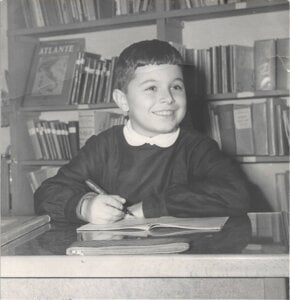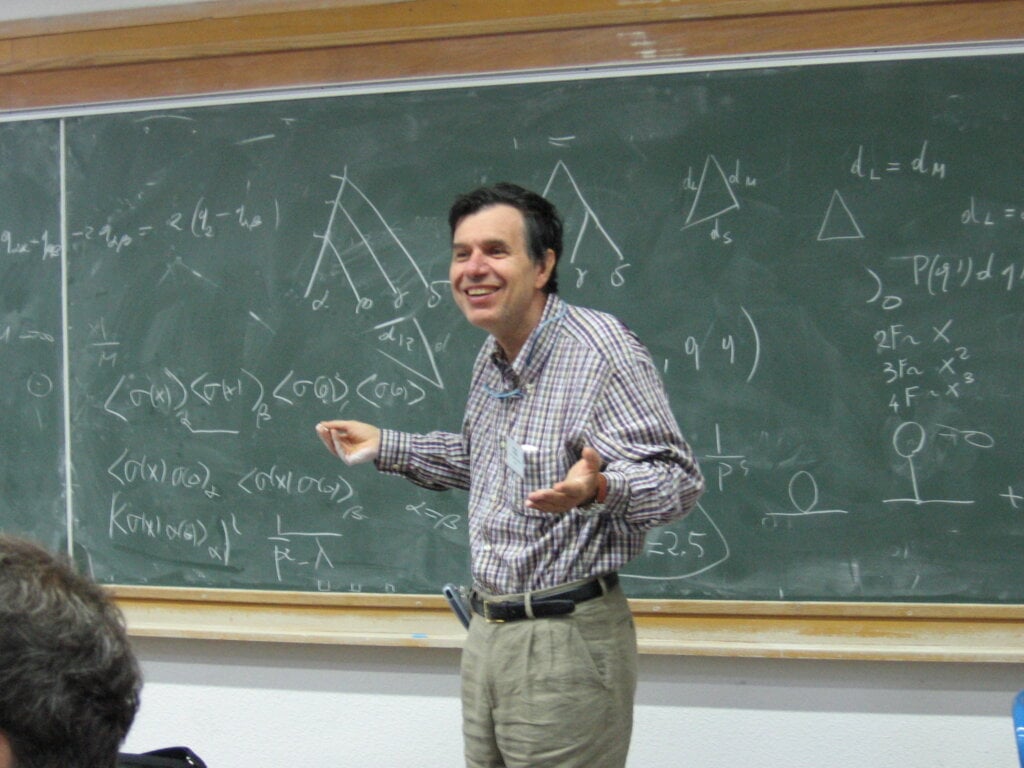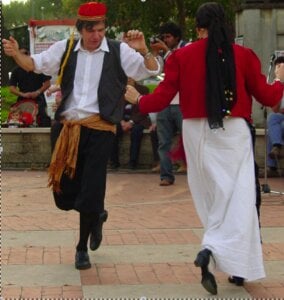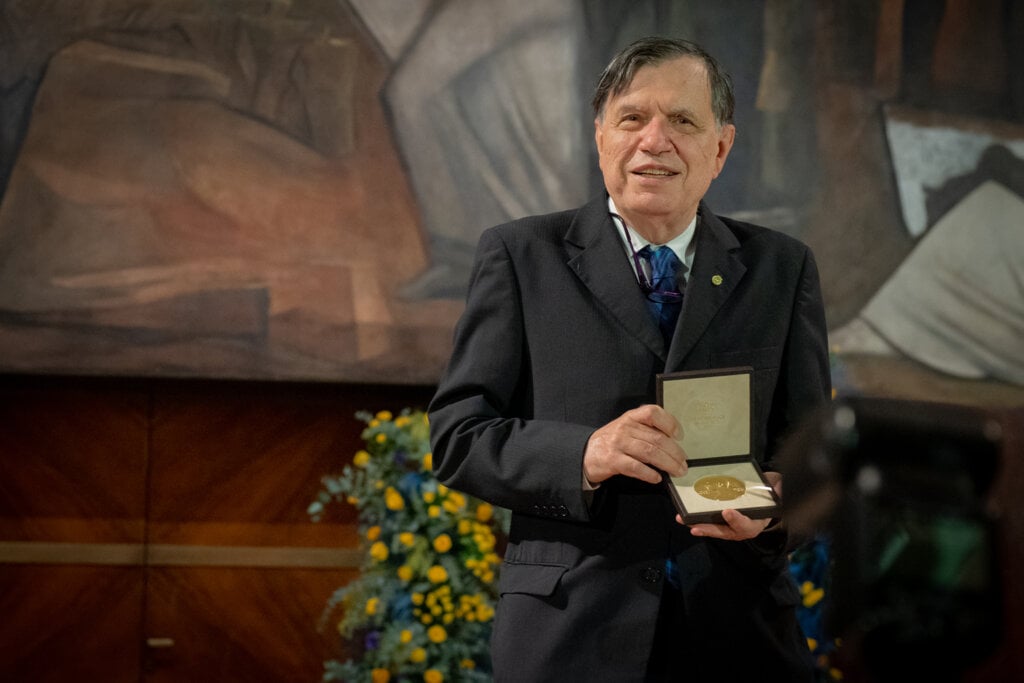“Self-confidence is an important ingredient”
Interview with Giorgio Parisi, February 2022
Nobelprize.org spoke to Giorgio Parisi on 18 February 2022. Our physics laureate told us about his love of reading, dancing and solving the puzzle that is our world.
Could you tell us a bit about your childhood. Were you always interested in science even as a child?

Giorgio Parisi in his school uniform in 1955.
Courtesy Giorgio Parisi
Georgio Parisi: Yes, let’s say that. I do not have very precise memory but my mother tells me that when I was three years old, I was already able to read the numbers. The typical activity was that when we were waiting for the bus at the bus station I was able to read the number of the buses that were arriving. I think that is true – it’s what my mother tells me – and what I am certain of is that when I was at elementary school, I was very interested in astronomy. I was reading books for children on astronomy, popular books, I had an idea of the distance of the planets from the sun, more or less an idea of the diameters of the planets and so on. And at 10 years old I started to read science fiction.
Was there a particular moment when you decided to become a physicist?
I think that during high school I was interested in mathematics and physics, but I was reading mostly non-professional books. I was reading something on the history of mathematics, the history of physics. There was a particular book on the history of mathematics that I liked very much.
When I finished high school, I started to think what I should do at university. My father wanted to me to do engineering. I found that engineering maybe was not interesting enough. I knew that I was very good at mathematics, but I had no particular idea of what mathematics was doing at that moment. I mean, this is my reconstruction, but in the end I decided on physics.
Was there a particular person, a teacher or role model, that influenced you in your early career?
Not, not too much. I think that when I was at high school, from up to 18 going to university, I did not speak to people about physics and mathematics. I think that I was not proactive in searching for them because I was satisfied by what I was doing. Sometimes I went to the library and read essentially articles in the encyclopedia, but I did not have any particularly contact [with anyone about it]. I would say the only person that did have an influence on me but in quite an indirect way was a friend of my family that had a microscope. They gave me a small microscope where I could see some very small animals, of a fraction of a millimeter and so on, that could not be seen by the naked eye. I spent a lot of time collecting dirty water, putting it on the microscope and looking at them. So I think that this was a positive influence in the idea that nature is interesting, that it’s surprising, that you can discover things and so on, but that was something that was not at all related to physics or to mathematics. In that way I was an autodidact.
Do you have any advice that you would give to a young researcher or young scientist just starting out in the field?
My advice is to try to understand his or her own abilities, and what interests them most. It’s clear that interests may change, abilities may be cultivated, but have some ideas of what they feel they can contribute. For example, for someone that is good in doing programming, maybe it’s not worthwhile doing lot of computation by hand. Or for someone that very much likes to do experiments, it’s better to do experiments instead of theory. Try to understand their own qualities, try to cultivate their own qualities and also be confident, because sometimes confidence is very important. If you are confident that you can do something you will do it.

Giorgio Parisi teaching
Courtesy Giorgio Parisi
Let me tell you a small anecdote, if I may. There was one conjecture on spin glass that we were not able to prove. Then someone told me that they proved this conjecture and they explained the proof to me, which was relatively simple. So, I was speaking with a friend of mine and he started the conversation by saying, well, I think that we are never going to be able to prove that conjecture, that it is too difficult. I told him, “No, no, no, you are wrong. Those people proved the conjecture.” And he said, “Ah okay, I see the proof.” And he told me the proof! The point was that he had more or less the same background of these two other people. So when I told him that the other two people have solved the proof, knowing what the other two people knew, he realised that it should be possible to do the proof. In 10 seconds or something like that, he told me the proof. It was quite amazing.
So you see that if you have confidence, that in some sense anybody if they were told that they have the capacity to solve the problem would be able to solve it. Self-confidence is very important. Of course, it’s clear that you can’t exaggerate with self-confidence. But I think that self-confidence is an important ingredient.
What do you like best about your work?
Well, there are many things. I think that doing science is like playing puzzles or reading a detective story and trying to understand who is guilty before the author tells you. I think that most people like to play with puzzles but as a scientist I think this is on a different scale because the type of puzzles that we are interested in are on a much bigger scale. And what is important is that we don’t play by ourselves, it’s all of the scientific community trying to solve this puzzle. So we work together and this is an intellectual pleasure that is important.
Also, the other thing that I think is important is that sometimes when you understand something, you and your team are the only ones that know this particular thing and you want to communicate to other people. I think that is something that also gives you lot of satisfaction when you discover something or come to a conclusion about some phenomenon.
And what do you enjoy doing outside of work?

Giorgio Parisi dancing a traditional Greek dance
Courtesy Giorgio Parisi
Well, it depends. These last two years have been somewhat difficult because, with COVID, a lot of activities were not possible. I always like to read books – novels, histories of science, science fiction and so on. For example, just in the last year, I read many things by Asimov, some of Asimov’s novels I’ve not read before. Also I read all of the Foundation Series in order, one after the other, which I always read in some random order and not contiguously. I very much like to go skiing, to the seaside, to do this kind of of activity outside. And, after 50, 55, I started to be strongly interested in traditional dance, for example, one that I like to dance is Greek dance. That is something that I like very much. I also do some couple dances, for example the one that I was doing before COVID was Forró, [a Brazilian dance].
Also I like walking. I am quite lucky that near to my house is a big villa, Villa Ada, which is I think two by three kilometers, something like that. So it’s large villa and I very much like to go there to walk.
Do you think it’s important to relax and have an outlet outside of work?
It’s clear that it is very important to relax. There’s always some kind of activity that in some way helps you to establish some good connection with your body in some sense… I mean, when you’re dancing, you have to pay attention to your body. It’s also good that there’s something that is very different from the usual thinking, if you have to think of the angle that you put the foot on the ground, if you have to think that before moving the foot on the ground I should move backwards a few centimeters in advance, I mean, it’s not necessary to do, but if you want to do with style, you should add such small movements and so on, concentrating all these kind of things. And also try to follow the music because you have to be on time. So all these activities they absorb you completely, and there are some kinds of activity that are completely different from what you do in your work so it’s very good for relaxing.
And how have you found your time since you have been awarded the Nobel Prize?
One of the things I found most amazing was that in Italy usually in this period one walks in the street with masks. But even with a mask sometimes I find that people stop me or just pass nearby me and say congratulations professor. It was something that was quite amazing to be recognised in the street by people I’ve never met.

2021 physics laureate Giorgio Parisi receiving his Nobel Prize medal and diploma in Rome, Italy.
© Nobel Prize Outreach. Photo: Laura Sbarbori
This interview has been edited for length and clarity.
First published: March 2022
Nobel Prizes and laureates
Six prizes were awarded for achievements that have conferred the greatest benefit to humankind. The 14 laureates' work and discoveries range from quantum tunnelling to promoting democratic rights.
See them all presented here.
